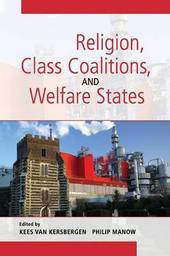
|
Religion, Class Coalitions, and Welfare States
Paperback / softback
Main Details
| Title |
Religion, Class Coalitions, and Welfare States
|
| Authors and Contributors |
Edited by Kees van Kersbergen
|
|
Edited by Philip Manow
|
| Series | Cambridge Studies in Social Theory, Religion and Politics |
|---|
| Physical Properties |
| Format:Paperback / softback | | Pages:320 | | Dimensions(mm): Height 226,Width 150 |
|
| ISBN/Barcode |
9780521723954
|
| Classifications | Dewey:320.3 |
|---|
| Audience | | Professional & Vocational | |
|---|
| Illustrations |
4 Tables, unspecified; 1 Line drawings, unspecified
|
|
Publishing Details |
| Publisher |
Cambridge University Press
|
| Imprint |
Cambridge University Press
|
| Publication Date |
6 April 2009 |
| Publication Country |
United Kingdom
|
Description
This book radically revises established knowledge in comparative welfare state studies and introduces a new perspective on how religion shaped modern social protection systems. The interplay of societal cleavage structures and electoral rules produced the different political class coalitions sustaining the three welfare regimes of the Western world. In countries with proportional electoral systems the absence or presence of state-church conflicts decided whether class remained the dominant source of coalition building or whether a political logic not exclusively based on socio-economic interests (e.g. religion) was introduced into politics, particularly social policy. The political class-coalitions in countries with majoritarian systems, on the other hand, allowed only for the residual-liberal welfare state to emerge, as in the US or the UK. This book also reconsiders the role of Protestantism. Reformed Protestantism substantially delayed and restricted modern social policy. The Lutheran state churches positively contributed to the introduction of social protection programs.
Author Biography
Kees van Kersbergen is a Professor of Political Science of VU University Amsterdam. He served as director of the Centre for Comparative Social Studies until 2007 and has also been professor of political science at the Radboud University (Nijmegen). He is the author of Social Capitalism 1995), which won the Stein Rokkan Prize in Comparative Social Science, and co-editor of Expansion and Fragmentation. Internationalization, Political Change and the Transformation of the Nation State. Philip Manow is a Professor of Political Science at the University of Konstanz. Previously, he was a researcher at the Max-Planck Institute for the Study of Societies, Cologne, and visiting fellow at the Centre for European Studies, Harvard, and at the Centre d'Etudes Europeennes, Sciences Po, Paris. His work has been published in numberous journals and collections, including European Journal of Political Research, West European Politics, Comparative Political Studies, The New Politics of the Welfare State (2001), and Federalism and the Welfare State (2008).
Reviews"Religion, Class Coalitions, and Welfare States is the most authoritative work so far on the impact of religion on welfare state development. It provides us with both a grand theoretical perspective and hugely rich analysis of how Protestantism and Catholicism meshed with politics and class in the evolution of social policies in Europe and America. This book has no rivals and is unlikely to have any for some time to come. It will have a tremendous impact on welfare state research in the coming years. This is historical and comparative social science at its very best, and Van Kersbergen and Manow deserve our thanks for putting it all together." -Gosta Esping-Andersen, Universitat Pompeu Fabra, Barcelona "If you think you know everything about class coalitions and social policies, think again. Kees van Kersbergen and Philip Manow's brilliant edited volume starts with the best recent work in political economy and pushes the cutting edge deep into history and contemporary policy debates. The book explains the origins and trajectories of different varieties of welfare states and traces out the roles that religion and conflicts over religion have played in the politics and political economies of advanced industrial societies. Scholars in economics, history, political science, policy studies, political economy, religion, and sociology will enjoy reading ten crisp chapters. Invite the contributors over to dinner at your own risk-they all know how to talk about politics, religion, and economics." -Andrew C. Gould, University of Notre Dame "This is a brilliant volume, which compels wide attention in the field of comparative politics, political economy, social policy, the welfare state and religion. It constructs a coherent account of the origins of the welfare state which integrates religious and economic cleavages, electoral rules and political institutions, in a historically grounded, theoretically tight manner. It challenges previous theories while moving the argument forward. A great book, a must read!" -Peter Gourevitch, University of California, San Diego "This book is an intellectual tour de force on the role of religion in the development of the modern welfare state. The editors outline an entirely new approach to the field, and the individual chapters offer a goldmine of historical research. It will become a standard reference for anyone interested in political parties and in European social, economic and political history." -Torben Iversen, Harvard University "This superb and highly integrated edited volume will be a central reference point for work on the role of religion in the political construction and evolution of the welfare state and more generally comparative political economy. It contains six excellent country chapters with serious historical depth. And it is structured analytically around the coalitions which Christian democratic and social democratic parties have been able to forge in different types of electoral systems, an analysis which Manow has played a large part in developing. We should be grateful to van Kersbergen and Manow for producing an unusually coherent and useful book." -David Soskice, Duke University
|